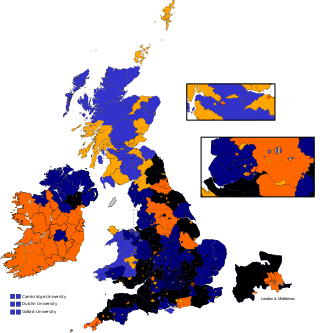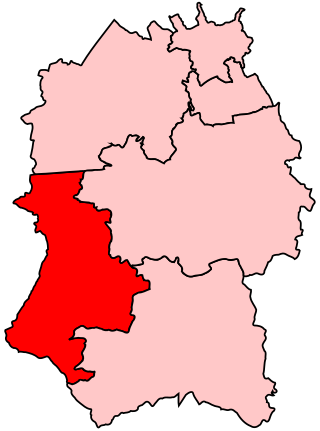
Salisbury is a constituency represented in the House of Commons of the UK Parliament since 2010 by John Glen of the Conservative Party.

Lancaster was a constituency of the House of Commons of the Parliament of England then of the Parliament of Great Britain from 1707 to 1800 and of the Parliament of the United Kingdom from 1801 to 1867, centred on the historic city of Lancaster in north-west England. It was represented by two Members of Parliament until the constituency was disenfranchised for corruption in 1867.
Stirling Burghs was a district of burghs constituency of the House of Commons of the Parliament of the United Kingdom from 1708 to 1918.
Flintshire was a parliamentary constituency in North-East Wales which generally returned one Member of Parliament (MP) to the House of Commons, latterly that of the Parliament of the United Kingdom, from 1542 until it was abolished for the 1950 general election.
Hastings was a parliamentary constituency in Sussex. It returned two Members of Parliament to the House of Commons of the Parliament of the United Kingdom until the 1885 general election, when its representation was reduced to one member. It was abolished for the 1983 general election, when it was partially replaced by the new Hastings and Rye constituency.
Hertford was the name of a parliamentary constituency in Hertfordshire, which elected Members of Parliament (MPs) from 1298 until 1974.
Oldham was a parliamentary constituency centred on the town of Oldham, England. It returned two Members of Parliament (MPs) to the House of Commons of the Parliament of the United Kingdom. The constituency was created by the Great Reform Act of 1832 and was abolished for the 1950 general election when it was split into the Oldham East and Oldham West constituencies.
Cricklade was a parliamentary constituency named after the town of Cricklade in Wiltshire.

East Cornwall was a county constituency in the House of Commons of the Parliament of the United Kingdom. It elected two Members of Parliament (MPs) by the bloc vote system of election.
Cockermouth was the name of a constituency of the House of Commons of the Parliament of England in 1295, and again from 1641, then of the Parliament of Great Britain from 1707 to 1800 and of the Parliament of the United Kingdom from 1801 to 1918. It was a parliamentary borough represented by two Members of Parliament until 1868, and by one member from 1868 to 1885. The name was then transferred to a county constituency electing one MP from 1885 until 1918.
Kingston upon Hull, often simply referred to as Hull, was a parliamentary constituency in Yorkshire, electing two members of parliament to the House of Commons of the Parliament of the United Kingdom, from 1305 until 1885. Its MPs included the anti-slavery campaigner, William Wilberforce, and the poet Andrew Marvell.

East Kent was a county constituency in Kent in South East England. It returned two Members of Parliament (MPs) to the House of Commons of the Parliament of the United Kingdom, elected by the first past the post system.
Swansea District before 1885 also known as Swansea District of Boroughs was a borough constituency. It was represented in the House of Commons of the Parliament of the United Kingdom. It elected one Member of Parliament (MP) by the first past the post system of election.
Boston was a parliamentary borough in Lincolnshire, which elected two Members of Parliament (MPs) to the House of Commons from 1547 until 1885, and then one member from 1885 until 1918, when the constituency was abolished.
Calne was a parliamentary borough in Wiltshire, which elected two Members of Parliament (MPs) to the House of Commons from 1295 until 1832, and then one member from 1832 until 1885, when the borough was abolished.
Wilton was the name of a parliamentary borough in Wiltshire. It was represented in the House of Commons of the Parliament of England from 1295 to 1707, then in the Parliament of Great Britain from 1707 to 1800 and finally in the House of Commons of the United Kingdom of the Parliament of the United Kingdom from 1801 to 1918. It had two Members of Parliament (MPs) until 1832, but from 1832 to 1885 only one member, as a result of the Reform Act 1832 where it also adsorbed the former rotten borough of Old Sarum. In 1885 the borough was abolished, but the name of the constituency was then transferred to a new county constituency electing one Member from 1885 until 1918.
Malmesbury was a parliamentary borough in Wiltshire, which elected two Members of Parliament (MPs) to the House of Commons from 1275 until 1832, and then one member from 1832 until 1885, when the borough was abolished.





